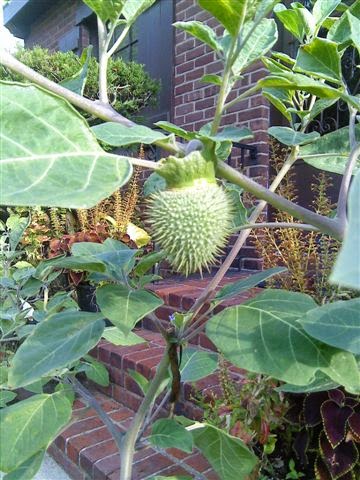 |
The Poison Herbs: From top: Mandrake, Mandrake small, Foxglove,Belladonna, Arium, St. John's wort, Belladonna, Foxglove, Arium,Thorn Apple, Thorn apple botanical drawing, Wormwood label, Wormwood.
Bewitch and Beware the Whole Year Through!
The setting for Behrendt’s novel
is Savannah, with noted squares and graveyards; but the gardens are pictured as
dark, very dark. Could these toxic herb have been part of the eerie
settings? All three outlined below live
in Georgia---and New Jersey--- It might have been.
The Thorn apple (Datura stramonium) is also known as Moonflower and Locoweed. It is part of the Poison Family---lower left hand side. It is both poisonous and medically
useful, as are its relatives in the nightshade family, Belladonna (Altropa belladonna) and Mandrake (Mandragora
officinarum).
If you handle the Thorn apple’s
seed pods carelessly, you will get pricked painfully. But when the pod opens,
the seeds do their dastardly work. Toxic reactions are due to alkaloids that
cause vision distortion, hallucinations, and can be fatal. Such is true with
Belladonna and Mandrake as well. These are not plants to display in a garden
club show and tell! Many of the parts of the plants are toxic; check your local
poison plant directory.
 The medicinal uses of these
nightshade members are surprising: Datura
was formerly an asthmatic medication, Belladonna
is an eye medication, and Mandrake
was used for stomach ills.
The medicinal uses of these
nightshade members are surprising: Datura
was formerly an asthmatic medication, Belladonna
is an eye medication, and Mandrake
was used for stomach ills.
Cornell notes their debilitating effect on
livestock, USDA lists them as ‘noxious plants’; and Native Americans from long
ago used them as hallucinogenic aids for ceremonies.
You
will find an exhibit in the Cloisters herb gardens in their "Magical Herb" section. There are
many others which could have been part of the same Garden, such as Foxglove and
Mayapple---but this will wait till another Halloween.
A closer view of the Thorn apple---see the prickly pods?
Sources (some)
U. Michigan: Native American Medical Plants Database
FDA: Poisonous Plants Database
A Modern Herbal
Cornell University’s Ag Extension publications
USDA .

No comments:
Post a Comment